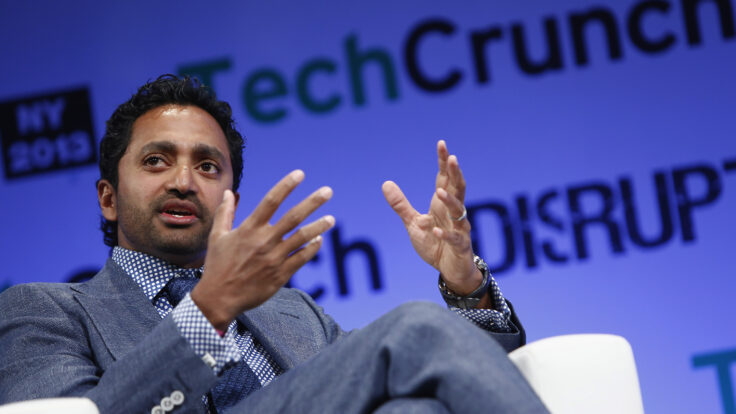 |
 |
|
Hello, and welcome back to The Best & The Brightest, your daily political dispatch. Today is Tuesday—which, as always, is foreign policy time. I’m your host, Julia Ioffe.
👶 A little bit of housekeeping before we get into it. There’s no hiding it anymore. I’m pregnant. Extremely pregnant. 36 weeks pregnant. So if I stop appearing in your inbox for a few months and my wonderful colleagues take over, know that Baby Ioffe is the reason why. Wish me luck!
💰 📝 Also: A quick reminder to fill out this survey for the Puck Private Conversation, powered by Orchestra, a new product we’ve been cooking up. We want your unvarnished opinion about everything, from who you think will win the election, to which candidate would actually be better for your industry. Trust me, it’s fun, and it will only take a few minutes.
Okay, now that the preliminaries are out of the way, a quick word on UNGA!
Today, President Biden delivered his last set of remarks before the U.N. General Assembly as the leader of the free world. The elder statesman, for whom foreign policy experience was always part of the pitch, recounted all the crises he had witnessed and worked on in the five decades since he was first elected to the U.S. Senate. It sounded like the table of contents of an I.R. textbook and had just about as much emotional oomph. Far more poignant was the visual of an outgoing president, aged by time and the weight of the office and all those geopolitical crises, calling on a broken, feckless U.N. to rise to the occasion and resolve these conflicts, knowing that he’s mostly run out of time to do so himself.
To me, the most stirring part of the speech came when Biden explained his decision to step aside rather than continue running for a second term. “Being president has been the honor of my life,” he said. “There’s so much more I want to get done. But as much as I love the job, I love the country more.” Then, addressing a room chock-full of representatives of states that are run by ruthless autocrats, he added, “My fellow leaders, let us never forget: Some things are more important than staying in power.” It was a truly powerful line.
And now, here’s Abby Livingston reporting on the Hill, which is scrambling to get it all done (i.e., keep the government open through the end of the year) before going on another long recess…
|
|
A MESSAGE FROM INSTAGRAM
|
 |
| Introducing Instagram Teen Accounts: a new experience for teens, guided by parents.
Starting in September, Instagram is launching Teen Accounts with built-in protections limiting who can contact teens and the content they can see. Plus, only parents can approve safety setting changes for teens under 16.
So parents can have more peace of mind when it comes to protecting their teens.
Learn More.
|
|
|
| L’Affair D’Esposito & Bernie in Texas |
|
As House Republicans maneuver to avoid a needless pre-election government shutdown, the usual chaos in Congress has taken a back seat to the drama on the campaign trail. Here’s how it could shake out back in Washington…
- D’oh! D’Esposito!: New York Rep. Anthony D’Esposito is in a heap of political trouble after The New York Times reported allegations that the Republican freshman put his mistress and his fiancée’s daughter on his office payroll. Leadership rallied to his defense, with Mike Johnson accusing the Times of publishing “a partisan hit piece.” D’Esposito later issued an indignant statement that was kind of a non-denial denial, and got the Manu Raju treatment outside the Capitol on Tuesday.
In the grand scheme of things, there’s a numbness on Capitol Hill after years of extramarital hijinks spanning the political divide. In the post-Trump era, in particular, there’s an emerging consensus that an affair is not a singularly disqualifying event. Nevertheless, the D’Esposito scandal went off like a bomb in Washington on Monday night, uniting the town’s political class in a bit of giddy rubbernecking because of the nepotism angle. While members do occasionally put family members on the campaign payroll, it’s still a frowned-upon practice that can get a politician in hot water with voters, if not the F.E.C. But it’s a very different situation when the behavior involves House rules and taxpayer money.
My early read from Republicans is that this is obviously no bueno, but the scale of the damage is T.B.D. until Democrats inevitably unleash ads all over the New York airwaves. D’Esposito’s race against Laura Gillen is rated a tossup by most analysts, echoing the importance of this seat as Democrats, finally playing offense, seek to win back the House. Then again, as a Republican strategist noted to me, flagrant patronage and unseemly hiring practices aren’t uncommon in Nassau County. Even if D’Esposito has to go before the House Ethics Committee, it’s unlikely the committee will take serious action before the election. Members are too busy with their own campaigns.
- Bernie touches down in Texas: Bernie Sanders is headed to Texas next week to campaign with freshman Rep. Greg Casar, perhaps the most prominently liberal member of the Texas delegation. But let’s be honest here: Casar is going to coast to reelection (he won his first race in 2022 by a 45 point margin). Instead, this campaign trip is all about the Ted Cruz vs. Colin Allred Senate race.
Obviously, the decision to deploy the most beloved and meme-worthy Senate lib to the state’s progressive bastions is about pumping up the base. No, Sanders doesn’t have the kind of broad appeal to campaign in a swingy county like Tarrant, but he could be effective at juicing voter registration in Austin. Sanders will continue on to San Marcos, home to Texas State University, and then to another liberal city, San Antonio.
Beyond money, one of the most precious commodities in a general election campaign is surrogate time. The mere fact that a Democrat with a devoted following and a measure of nationwide fame is choosing to campaign in Texas speaks to the seriousness with which Democrats are treating this race. Yes, it’s a long shot: The conventional wisdom among people in the know is that Cruz will probably win. But Allred is running an awfully good campaign. If Democrats can prevail here, they have a decent shot at holding the upper chamber gavel, too.
|
 |
| Blinken Contempt & Havana Syndrome, Revisited |
| News and notes from Washington, on Mike McCaul’s ulterior motive for subpoenaing Anthony Blinken, and a new development in the endlessly curious case of the C.I.A. and the “Anomalous Health Incidents” it has struggled to explain. |
|
|
|
| President Joe Biden was accompanied in New York today for his final U.N. General Assembly by his secretary of state, Antony Blinken. There is certainly lots for Blinken to do during UNGA week, when world leaders and their top deputies converge on Manhattan. In terms of efficiently scheduling meetings, it’s like shooting fish in a barrel: You can see so many people in so little time, all without having to jet around the world and make a gazillion stops. And, between the wars in Ukraine, Gaza, Lebanon, and Sudan, there is obviously no shortage of subjects for the secretary to discuss with his international counterparts.
And yet while he was debating the war in Ukraine at the Security Council today, House Republican Mike McCaul called on Blinken to testify before the Congress about his role in the U.S. withdrawal from Afghanistan. McCaul, a fiery Texan and the chairman of the House Foreign Affairs Committee, issued a scathing report about the pull-out on September 8. Shortly afterward, he issued a subpoena for Blinken. McCaul initially requested Blinken to appear last week, but the secretary was in Egypt, trying to secure that impossibly elusive Gaza ceasefire deal. So McCaul moved the date to today. And having failed to secure it—because, as he knew, Blinken would be at UNGA—he subsequently filed a motion last week to hold Blinken in contempt.
|
|
A MESSAGE FROM INSTAGRAM
|
 |
| Introducing Instagram Teen Accounts with automatic protections for teens.
Starting in September, Instagram is launching Teen Accounts with built-in protections limiting who can contact teens and the content they can see. Plus, only parents can approve safety setting changes for teens under 16.
This means parents can have more peace of mind when it comes to protecting their teens.
Learn More.
|
|
|
| The State Department has pushed back, pointing out the number of times that Blinken has testified in Congress about Afghanistan (14) and in front of McCaul’s committee (four). Further, they pointed out that State had offered McCaul other scheduling options, and he had rejected all of them, including an offer for Blinken to testify in November. (The House is out in October and only reconvenes after the election.) “They obviously want to get it in before the election,” a Democratic committee member said. (The resolution makes a point of tying Kamala Harris to the chaos, noting that she has said she was “the last person in the room” before Biden made the decision to withdraw.)
Why is McCaul doing this, other than to create pre-election headaches? Well, the Biden administration has pointed to McCaul’s long-shot bid to stay on as head of the powerful and prestigious Foreign Affairs Committee. Republicans have set term limits of five years for such roles (Dems haven’t), and McCaul is approaching its expiration. To extend his chairmanship past the allowable five years, he has to ask Speaker Mike Johnson for a waiver, which McCaul did back in July. But the competition is fierce, with at least six Republicans on the committee vying for the leadership post.
On top of that, in August, conservative journalist Jerry Dunleavy, who had joined McCaul’s team to investigate the Afghanistan withdrawal, resigned in protest, saying, essentially, that McCaul had been pulling his punches.“That’s why he’s doing this now. He needs to look tough,” a senior administration official told me. “And honestly, he’s quietly said that to people.” McCaul’s office did not respond to repeated requests for comment.
The committee votes on the contempt motion tonight and, if it passes (as is widely expected), it will go to a floor vote as soon as tomorrow. It will likely pass there as well. That will make Blinken the first secretary of state in American history to be held in contempt. The White House, for its part, understands there’s little they can do at this point to prevent this outcome. “When there’s leadership and politics involved, it’s really hard to stop that train,” the official said.
|
|
|
| Meanwhile, last week brought a new development on the intriguing topic of Anomalous Health Incidents, or A.H.I.s, previously known as “Havana Syndrome”—one of the longest-standing, and strangest, mysteries in Washington. Brian Karem, a reporter for Salon, published the results of a FOIA request he’d submitted to the C.I.A. that turned up a heavily redacted whistleblower complaint filed by an agency employee. It alleged that C.I.A. higher-ups were tampering with witnesses, suppressing evidence, and generally forcing a false consensus on the Anomalous Health Incidents.
The phenomenon, if you recall, was first reported by U.S. embassy personnel in Havana, thus the name, in 2016. State Department and C.I.A. employees reported hearing a strange sound and feeling pressure in their skulls, which, according to the victims, caused a bouquet of debilitating symptoms: vomiting, vertigo, migraines, amnesia, vision and hearing loss, and the like. The symptoms came and went and often lingered for years.
After Havana, overseas government employees reported similar experiences in China, Russia, Australia, Austria, the U.K., Taiwan, Georgia, and even on U.S. soil, as I reported in 2020, in the D.C. suburbs. People also reported that even their pets and children had been “hit,” and many State Department and C.I.A. employees were forced to retire early because of the syndrome’s physical toll. Early evidence and speculation seemed to point to a directed energy weapon wielded by the Russians.
|
|
|
| The Hill took notice, as did the then-new Biden administration. But in March 2023, the C.I.A. released a report that seemed to put the whole thing to bed. Even as the number of people affected continued to climb and the geographical reach spread, agency investigators said they’d found no evidence of a weapon or a foreign adversary as the culprit. C.I.A. Director Bill Burns and administration officials made clear that, while they didn’t doubt their employees were in real pain, there was no concrete evidence of a common cause. And that, the C.I.A. wanted to believe, was that.
But of course, it wasn’t. Victims continued to sound the alarm and advocate for more clarity. Everyone inside Langley seemed to know someone who’d been “hit,” and they found no reason to disbelieve their colleagues. Meanwhile, independent investigators and journalists stayed on the case. In April, Christo Grozev, Roman Dobrokhotov, and Michael Weiss published a piece in The Insider that pointed to a Russian G.R.U. unit that had been hopscotching across the globe and attacking U.S. officials.
The whistleblower complaint, filed in January 2023, claims the C.I.A. discouraged victims from speaking to the F.B.I.—which was investigating the incidents as potential crimes committed against U.S. citizens at home and abroad—and that those who did speak to the bureau were punished at the agency. In the complaint, the whistleblower wrote, “I have reason to believe this assessment”—referring to what became the Agency’s nothing-to-see-here report—“is designed to convey the appearance of I.C. consensus when no such consensus exists.” Further, the whistleblower accused the agency of withholding information from Congress.
The complaint led to an investigation by the House Permanent Select Committee on Intelligence (HPSCI) last year. It is still ongoing. The whistleblower, according to their attorney Mark Zaid, is still a C.I.A. employee and has been involved in the investigations into A.H.I.s. “They’re still inside,” said Zaid, who represents many of the A.H.I. victims, as well as another agency whistleblower whose complaint kicked off Donald Trump’s first impeachment. “They’re not low level, but not senior. They are someone who has had access to this information throughout the federal government. This person is not a victim, but they have participated in many of the investigations on the inside.”
As someone who has been writing about this phenomenon for the past four years, I have to confess that it only gets curiouser and curiouser. Why would the C.I.A. be so eager to dismiss something that so many of its own employees, current and former, are convinced is real? And who is right: the people who fervently believe this is a Russian directed energy attack, or the people who fervently believe it’s a case of mass psychosis?
A topic that was once fair game in Washington national security circles has now become akin to talking about U.F.O.s. People will tell you quietly they believe something happened, but they don’t know what. “You’ll notice it’s the same few people who are keeping the story alive,” one Hill staffer working on the issue told me.
For what it’s worth, the staffer believes that something had happened to the A.H.I. victims, but what, exactly, and why hush it up? “The former [C.I.A. director of operations] said this has to go away, because we’ll never have anyone [agree] to go abroad again,” a former agency employee told me. Who, indeed, would willingly relocate themselves and their families overseas and risk a debilitating attack from an untraceable source? And remember: This wasn’t happening to diplomats in Kabul or Mogadishu. It was happening in the cushy posts, places like London and Vienna.
Others posited that these attacks would constitute an act of war and acknowledging them would compel Washington to respond in some very concrete way. There is also another theory. “The thought is, to what extent are we, the U.S., doing the same thing or similar?” said Zaid, the attorney for the whistleblower. “We invented this technology as a collection mechanism, and other countries have improved it and weaponized it.” If this were the case, the C.I.A. could be wary of information about its own classified technology getting out. Why else, Zaid went on, would Burns and Blinken wear “wearable detection devices for directed energy”? I asked him if I heard that right. “I’ve been told—and by multiple people—that they do that,” Zaid shrugged. “Which makes perfect sense.”
“That’s totally nuts,” a senior administration official scoffed. “That’s bonkers.” But the official thought about it for a moment and admitted that there are guys who travel with high-ranking officials like Blinken and Burns, the networking guys, who carry all kinds of sensitive electronic equipment, so that the secretary and director can, for example, make secure calls from their planes. Maybe the rumored detection devices were part of the kit? “I have no idea,” this official said. “And if I asked them, they wouldn’t tell me.” Then they thought about it some more: “No, that’s nuts. Why would they be covering up evidence of Russian malfeasance? It doesn’t add up. We fucking hate the Russians, we call them out all the time.”
It was a lot harder, the official said, to tell the A.H.I. victims that what had happened to them, hadn’t happened. “It would be so much easier if it were the Russians or the Chinese,” the official sighed.
|
|
|
| That’s all from me this week, friends. See you back here next week—maybe? Regardless, good night, and always remember, tomorrow will be worse.
Julia
|
|
|
|
| FOUR STORIES WE’RE TALKING ABOUT |
 |
| The Gen X Gap |
| Untangling a generational shift emerging in national polls. |
| PETER HAMBY |
|
 |
| Sabato Theories |
| Intel from Milan about Gucci’s looming restructuring. |
| LAUREN SHERMAN |
|
 |
|
 |
|
|
|

|
 |
|
|
|
Need help? Review our FAQs
page or contact
us for assistance. For brand partnerships, email ads@puck.news.
|
|
You received this email because you signed up to receive emails from Puck, or as part of your Puck account associated with . To stop receiving this newsletter and/or manage all your email preferences, click here.
|
|
Puck is published by Heat Media LLC. 227 W 17th St New York, NY 10011.
|
|
|
|



















